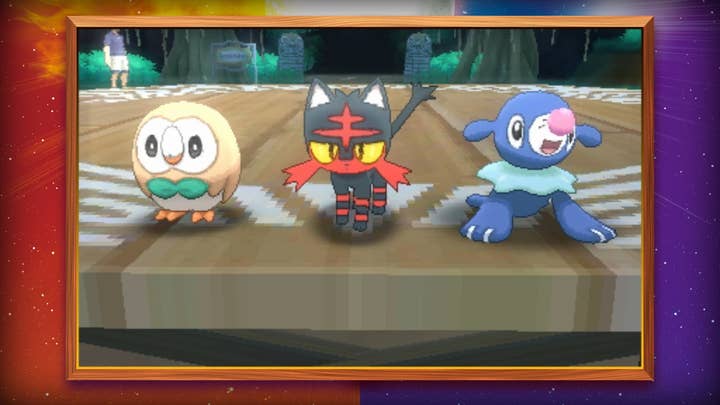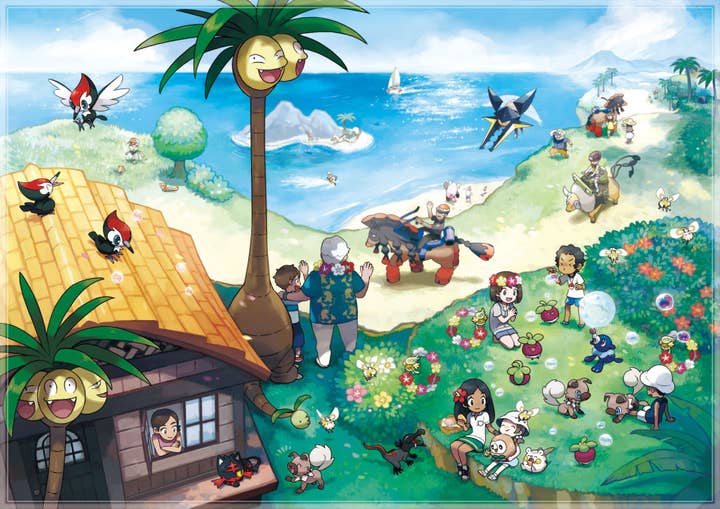Critical Consensus: Pokemon Sun and Moon
Game Freak wows critics with a new director, fresh ingredients and just enough nostalgia
Until I installed Pokemon Go earlier this year, I'd never laid hands on a Pokemon Game. Just too old to have caught the fever of the the first wave, the series never pulled me in to its obsessive circle, that first impression of it being 'for kids' staying strong enough to keep it from my gaming agenda.
Still, it's a testament to the phenomenal cultural reach of the IP that, when I did spend a couple of months slavishly glued to the screen of my phone wherever I went, tapping at an invisible menagerie, I knew pretty much exactly what was going on. I understood what gyms were, knew about the mechanics of capture and evolution, and realised that I'd stored a quite worrying number of names for imaginary creatures in brainspace which could presumably have seen more productive uses. Pokemon is a phenomenon - its mascots and icons ranking amongst the most globally recognisable.
As such, it's always been a big hitter for its triumvirate of beneficiaries: Nintendo, Game Freak and The Pokemon company - a true system seller capable of shifting global stock by several points. But, like many of Nintendo's most successful games, Pokemon has always ridden a tight line between innovation and the preservation of the well honed mechanics at its centre. And, like many of those other games, it has always been in danger of appearing to rest on its creative laurels a little as a result. Sun and Moon, however, marks a noted overt freshness in approach, with a masterfully executed pre-release marketing plan seeing long term fans and new recruits alike anticipating a world of tantalising adventure under new series director Shigeru Ohmori.
With the game finally in reviewer's hands, scores are ranging from full marks to 80% and Sun and Moon has established itself a Metacritic score of 88%, proving that, so far, the risks have paid off.
""With Ohmori's direction the sacred formula hasn't just been readjusted, in some cases it's been totally reinvented"
Chris Tapsell, Eurogamer
Eurogamer's Chris Tapsell, who I can personally attest to being exactly the sort of man who keeps Pokemon plushies on his desk, was thrilled by this balance of nostalgic loyalty and innovation, praising the bravery with which the newest entries in the series approaches some of its most well-established tropes.
"With Ohmori's direction the sacred formula hasn't just been readjusted, in some cases it's been totally reinvented," writes Tapsell in a review which award's Eurogamer's highest 'essential' badge. "Gyms and Gym Leaders; the Elite Four; Day Care; HMs; out-of-combat moves; even recent poster children like Mega-Evolution, the hallowed secrecy of Individual Values, and the series' very operating parable of how we all need to just love our Pokémon have been either re-worked, re-thought, or totally removed.
"That, I admit, was a little scary for a someone who has lent so heavily on the game's crutches of comfort and familiarity. I'm one of the more staunch defenders of HMs, for instance; they force you into an old-school, zero-sum tradeoff between the most powerful team and the one which is most well-prepared, and balancing that - finding the best 'HM Slave' and team to go with it - became something of an art in itself for the community, too. But for every cause for concern, on learning something else had been tweaked or changed, my hesitancy has been proven wrong. Time and again, Pokémon Sun and Moon surprises with its thoughtfulness, detail, and craft."

Full of praise for Sun and Moon's innovative shift of narrative loop, which sees players embarking on journeys to different islands which offer entirely different challenges rather than the gradual grind to gym leader of previous entries, Tapsell notes that these changes not only refresh the processes of progression, but allow for the characters, and the Pokemon themselves, a little more space to breathe.
"Powerful trainers who maintain a close bond with their island's respective guardian Pokémon, the Tapu, island Kahunas are also some of the best things about Sun and Moon. They benefit from some wonderful animation, an elongated involvement with the story, and some genuinely funny cutscenes - yes cutscenes! In Pokémon! And they're good! - and with that added room to grow, those characters flourish."
Sun and Moon also draw top marks from Nintendo Insider, where Alex Seedhouse again praises the bravery of Game Freak in upsetting such a well-established rhythm in such a successful way. Key to that new structure, he notes, is Sun and Moon's regional Pokemon variations.
"With critters old and new awaiting discovery across the four islands, the Pokédex has a renewed purpose in how it has been approached to boot. The Alola Pokédex is broken down between each island, and, while there is some crossover between the four, this is a massive help for those that want to catch 'em all. The Pokédex also now groups Pokémon with their evolutions, which will benefit those less familiar with past generations in understanding whether they can work on training a Pokémon that they have already caught or if they need to hunt out an entirely new one."
"The Alola Pokédex is broken down between each island, and, while there is some crossover between the four, this is a massive help for those that want to catch 'em all"
Alex Seedhouse, Nintendo Insider
Sedhouse also favours the switch from previous generations' Hidden Machines mechanic to the use of Pokemon Rides, where players can summon specific allies to perform out of battle tasks such as breaking rocks or traversing water - a useful skill in an island chain. He's also a fan of the games' attempts to include features of some of the IP offshoots, such as Amie and Snap.
"Next up is the Poké Finder, which can be used at photo spots peppered across the Alola region. This can partly be seen as a spiritual successor to Pokémon Snap, letting you use the Rotom Pokédex to take pictures of nearby Pokémon. Your pictures are judged with thumbs up, and, as you take better pictures, you will unlock more features to help take better snaps such as zooming in. (Prepare to lose plenty of hours with this!)"
IGN's Kallie Plagge drops Pokemon a mark from a perfect score, but is still full of positives in a 9/10 assessment, finding particular praise for a structure which keeps players focused on the task at hand, rather than dreaming of the end game as they grind their way through early stages.
"Bringing the challenges out into the world, rather than keeping each step toward becoming a champion segmented in its own gym, helped Alola feel more like a place where things happen instead of an overworld map. It also kept the Island Challenge from becoming mindless - I couldn't autopilot my way through it like I could with a lot of X and Y, for example. I didn't always know when or where a trial would start or what exactly would happen when I got there, and that kept me on my toes, frequently fine-tuning my team and trying out a lot more Pokemon than I usually do during an initial run.
"Alola is the most inspired region in Pokemon so far, and that made exploring it fun and rewarding. Instead of just looking for items or places to grind, I was taught to expect the unexpected."

Still, Plagge finds some awkwardness and predictability in the storyline and characters of Sun and Moon, even whilst she acknowledges that they serve their purpose. Nonetheless, her conclusion is a positive one.
"After 20 years of slow but steady evolution, Pokemon gets a bit of a reinvention in Sun and Moon. An engrossing and rich new region makes the Alola journey - along with all the changes Sun and Moon make to the existing formula - enjoyable throughout the main adventure, and small interface and variety of upgrades along the way make a few of the things that stayed the same feel better than before."
Over at CGM Online, Cody Orme drops a relatively lowball score of 8, offering the lower bracket to a very impressive selection. Contributing that minor dip in performance, for Orme at least, is the feeling that Sun and Moon treat their players with slightly too much condescension.
"This is my first big issue with Pokémon Sun - its hand holding. Pokémon has never been a hardcore RPG, but it's still an RPG. It's hard to feel that I'm part of a huge adventure when it is so linear. Maps follow very specific trails with little chance to deviate, and you can't move past literal barricades until you complete trials. RPGs are supposed to be big, open adventures, and while Pokémon Sun feels big, it is far too streamlined. But that's not very new for the series."
It's a criticism echoed elsewhere, and is perhaps a consequence of a series which might see the death of its more traditional dedicated handheld home on the not too distant horizon - even with the Switch promising a new take on portable gaming, this is likely going to be the last Pokemon proper to see launch on the vast install base of the 3DS, so netting as many new devotees as possible for a new phase is going to be key to carrying that success over.
With this fresh start under the belt in preparation for that transition, and with a Switch port seemingly an absolute no-brainer, Pokemon's legacy looks set to blossom afresh.
